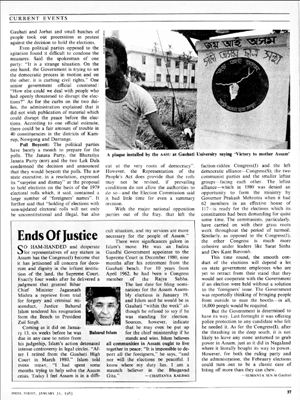ENDS OF JUSTICE
[India Today]
Published date: 31st Jan 1983
Gauhati and Jorhat and small batches people took out processions in protest against the decision to hold the elections.
Even political parties opposed to the agitation found it difficult to condone the measures. Said the spokesman of one party : “It is a strange situation. On the one hand, the Government is trying to set the democratic process in motion and on the other, it is curbing civil rights.” One senior government official countered: “How else could we deal with people who had openly threatened to disrupt the elections?” As for the curbs on the two dailies, the administration explained that it did not wish publication of material which could disrupt the peace before the elections. According to one official estimate, there could be a fair amount of trouble in 40 constituencies in the districts of Kamrup, Nowgong and Darrange.
Poll Boycott: The political parties have barely a month to prepare for the polls. The Janata Party, the Bharatiya Janata Party (BJP) and the two Lok Dals condemned the decision and announced that they would boycott the polls. The BJP state executive, in a resolution, expressed its “surprise and dismay” at the proposal to hold elections on the basis of the 1979 electoral rolls which, it said, contained a large number of “foreigners’ names”. It further said that “holding of elections with non-updated electoral rolls will not only be unconstitutional and illegal, but also cut at the very roots of democracy”. However, the Representation of the People’s Act does provide that the rolls may not be revised, if prevailing conditions do not allow the authorities to do so—and the Election Commission said it had little time for even a summary revision.
With the major national opposition parties out of the fray, that left the faction-ridden Congress(I) and the left democratic alliance—Congress(S), the two communist parties and the smaller leftist groups—facing each other. The leftist alliance—which in 1980 was denied an opportunity to form the ministry by Governor Prakash Mehrotra when it had 62 members in an effective house of 117—is ready for the elections which its constituents had been demanding for quite some time. The communists, particularly, have carried on with their grass roots work throughout the period of turmoil. Similarly, as opposed to the Congress(I), the other Congress is much more cohesive under leaders like Sarat Sinha and Dev Kant Barooah.
This time round, the smooth conduct of the elections will depend a lot on state government employees who are yet to retract from their stand that they would not cooperate with the Government if an election were held without a solution to the ‘foreigners’ issue. The Government was reportedly thinking of bringing people from outside to man the booths—in all, 16,000 people would be required. But the Government is determined to have its way. Last fortnight it was offering police protection to any candidate who felt he needed it. As for the Congress(I), after the thrashing in the deep south, it is not likely to leave any stone unturned to grab power in Assam, just as it did in Nagaland where it literally bought its way to power. However, for both the ruling party and the administration, the February elections could turn .out to be a classic case of biting off more than they can chew.
Ends Of Justice
So Ham-Handed and desperate for representatives of any stature in Assam has the Congress(I) become that it has jettisoned all concern for decorum and dignity in the loftiest institution of the land, the Supreme Court. Exactly four weeks after he delivered a judgment that granted Bihar Chief Minister Jagannath Mishra a reprieve from trial for forgery and criminal misconduct, Justice Baharul Islam tendered his resignation from the Bench to President Zail Singh.
Coming as it did on January 13, six weeks before he was due in any case to retire from his judgeship, Islam’s action detonated intense controversy in legal circles. “After I retired from the Gauhati High Court in March 1980,” Islam told INDIA TODAY, “I had spent some months trying to help solve the Assam crisis. Today I feel Assam is in a difficult situation, and my services are more necessary for the people of Assam.”
There were significances galore in Islam’s move. He was an Indira Gandhi Government appointee to the Supreme Court in December 1980, nine months after his retirement from the Gauhati bench. For 10 years from April 1962, he had been a Congress member of the Rajya Sabha. The last date for filing nominations for the Assam Assembly elections is January 19, and Islam said he would be in Gauhati “within the week” although he refused to say if he was standing for election. Sources, however, indicate that he may even be put up for the chief ministership if he stands and wins. Islam believes all communities in Assam ought to live together in peace; “It is impossible to deport all the foreigners,” he says, “and nor will the elections be peaceful. 1 know where my duty lies. I am a staunch believer in the Bhagavad Gita.






